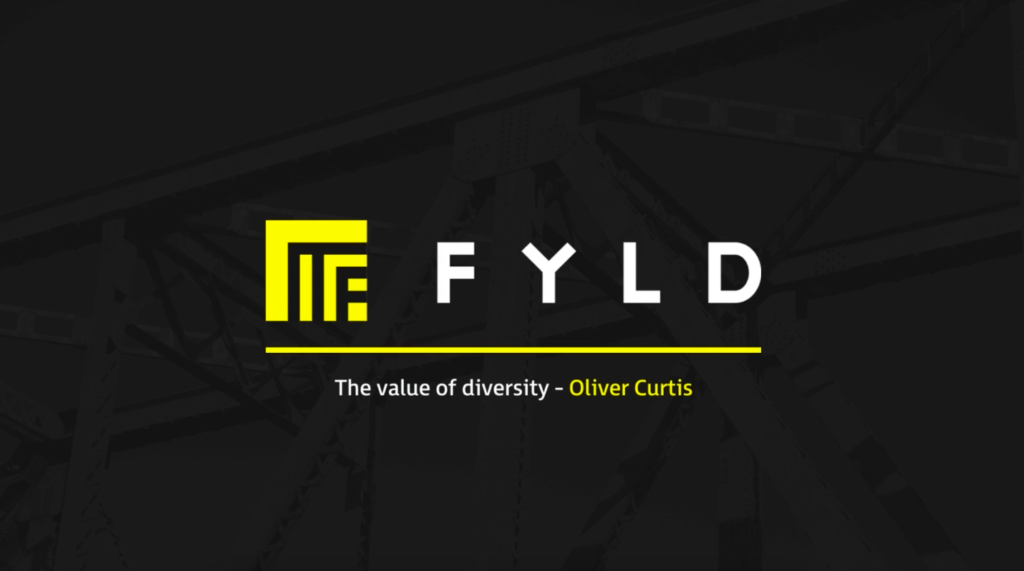What diversity means to me – Oliver Curtis, Software Engineer
In the first of our ‘What diversity means to me’ blog series, we sat down with Software Engineer, Oliver Curtis, to discuss his experience in different cultures and how this has impacted his role at FYLD. We also take a look at the importance of diversity, equity and inclusion within the workplace and how FYLD implement these key elements in its operations…
Tell us a bit about your life journey up until joining FYLD.
I left school with no idea of what I wanted to do. After a brief spell in insurance, I realised it wasn’t for me and that I needed to find what made me happy, so I set my sights on South America.
Upon returning to the UK, I decided to follow my passion for software engineering and began studying Computer Science at Bournemouth University. A 12-month internship followed my graduation, and after completing it in just six months I was offered my first full time role. I gained valuable knowledge and experience working for a start-up company, preparing me well for joining FYLD.
Tell us more about your experience working at FYLD?
I currently live in Brazil with my wife and son, who was born here during the pandemic. I was living in the UK when I started working at FYLD, but after conversations with the wider team, the company enabled me to relocate to be with them. A unique and potentially challenging request like this could have been difficult to accommodate for some companies, but FYLD was on board to work with me and to a positive solution for all. I showed the leadership team how the relocation would work, and they showed trust in me.
Despite being halfway around the world from the majority of FYLD’s team, I feel included here. I am empowered to share my voice and to speak up about my ideas. With the relaxed hierarchy in place, it feels natural to go to anyone with an issue or idea. Within the software engineering team, we are spread across three countries – Brazil, England and Hungary – yet we are all very close and work together seamlessly.

Diversity, equity and inclusion are three key pillars of a fair and progressive workplace. How do you feel FYLD implements these three elements in its operations?
FYLD considers candidates from all backgrounds and origins which makes the workplace culture incredibly interesting. FYLD’s recruitment process isn’t entirely based on experience or specific skillsets, instead they find people that match the culture and values of the company – as well as being qualified for the job. By adopting this approach, FYLD brings together amazing people, each with their own unique story, creating a group that works well across all geographies, time zones and skills.
The people of FYLD recognise life outside of the office, with everyone’s situation being considered and supported. I receive so much valued support from FYLD and it’s reassuring to have leaders that understand how important family is.
How do you think your career and wider experiences have been enhanced by exposure to diverse people, places, or environments?
Being exposed to other cultures, both in my personal life and in my career, has allowed me to understand the nuances of human behaviour and make sure that the right communication channels are in place from the start.
As you can imagine, moving to Brazil without knowing much Portuguese – despite knowing a little Spanish – was going to require a lot of learning. I learned not to be self-conscious and be honest if I was confused by the language. There are positives to feeling uncomfortable and putting yourself out there in the workplace – it’s how we all learn from each other.
What steps do you think the tech industry needs to take to ensure equity for all working in the sector?
A huge challenge for the tech industry is the recruitment of entry-level candidates. Businesses risk missing out on great talent based on often outdated recruitment criteria. By factoring in a person’s character and soft skills, as well as the knowledge and experience they can bring, businesses gain an employee that fits into the workplace culture.
Apprenticeships could also benefit the industry. Personally, I felt there was a lack of opportunities available at the start of my career. By introducing more apprenticeships in the tech industry, the transition from education to employment would be easier for so many.
Lastly, the industry moves so fast. Those who take a career break, and especially women, often struggle to get back in to the groove due to lack of employer support. More support for mothers returning to work is required – it is essential for the growth of the tech industry and will help to break the stigma that this is a male-dominated sector.
Interested in a career at FYLD? Check out our careers page for more information.






